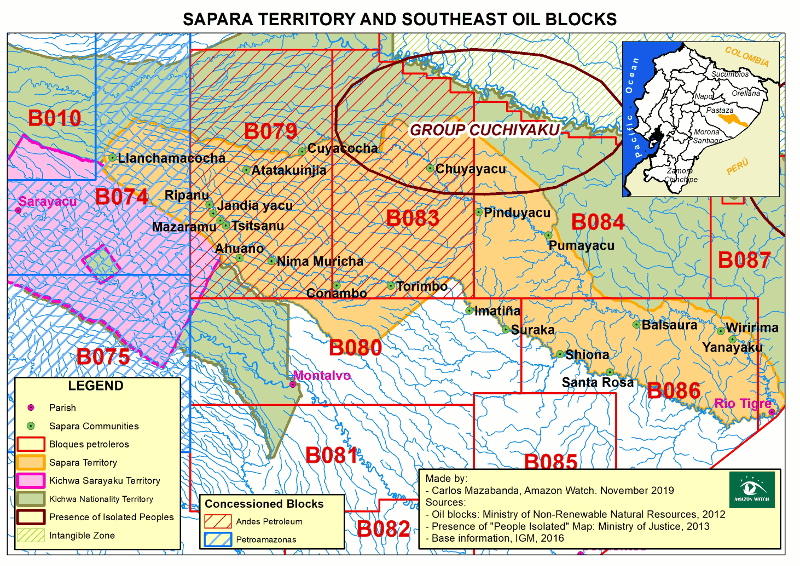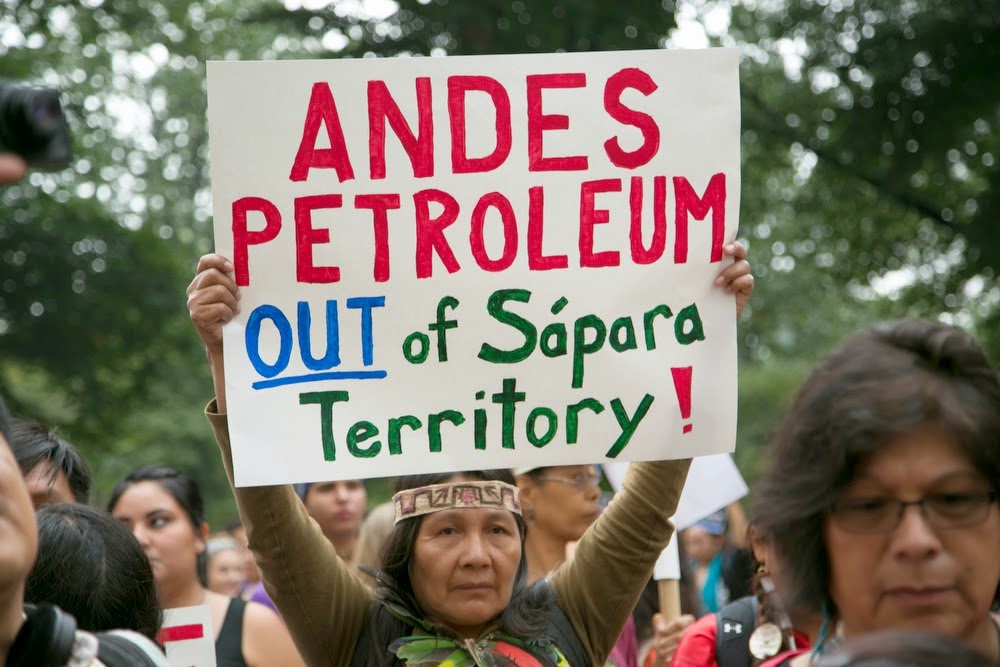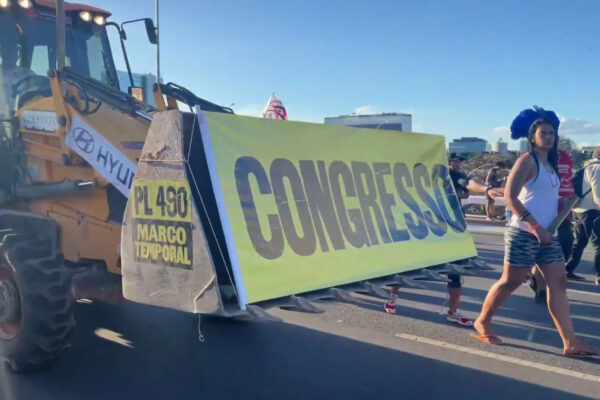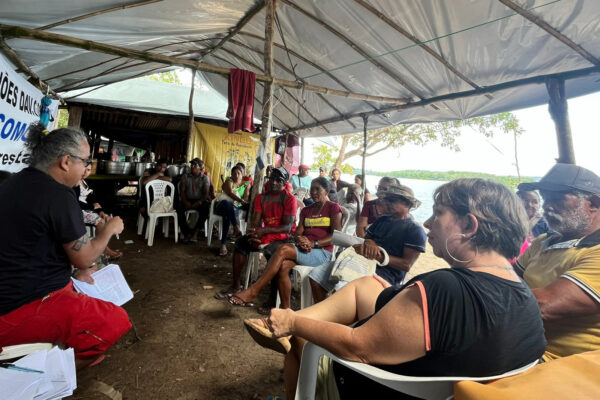“The declaration by the government of force majeure in Block 79 is a result of our fight, and it was forced to recognize that these territories are ours, we live there. We are asking the government to remove all oil concessions from our territories. We will remain vigilant.”
Yanda Montahuano, Sapara leader
The indigenous resistance to oil extraction in Ecuador earned another major victory this week. Success was achieved in the multiyear effort to stop drilling plans by Andes Petroleum in a 158,000-hectare rainforest concession known as Block 79, which overlaps the titled territory of the Sapara and Kichwa indigenous nationalities.
Last June, we shared the news that grassroots action in Ecuador had forced the government to shelve plans to tender two new controversial oil blocks along the border with Peru over community opposition from the Shiwiar, Kichwa, and Sapara indigenous nations whose land the 1,500-square-mile concessions overlap. Building upon that success, national and international pressure has yet again thwarted efforts to expand oil drilling in the Amazon.
Ecuador’s Ministry of Energy and Non-Renewable Natural Resources issued a resolution on October 10th granting a force majeure request by Andes Petroleum – a Chinese joint venture by CNPC (China National Petroleum Company) and SINOPEC (China Petroleum & Chemical Corporation) – due to the “resistance and social and political opposition” of indigenous peoples potentially affected by the project.
The decision from Ecuador’s Energy Ministry comes on the heels of new momentum by the indigenous movement against extraction, attacks against indigenous earth defenders, and a global outcry over the destruction of the Amazon. In Ecuador, one of the largest indigenous strikes in modern history derailed an IMF economic austerity package and the movement continues to call for an end to new oil and mining extraction. A recent court decision in the Waorani v Ecuador case determined that Ecuador’s consultation process with indigenous peoples on oil blocks slated to be tendered violated the country’s own constitution and underscored the absence of a consultation law to regulate such a process. And a recent report from the UN Special Rapporteur on Indigenous Peoples found that Ecuador lacked the conditions for indigenous peoples to exert their basic right to Free, Prior Informed Consent (FPIC).

This victory is particularly important to the Sapara, who number only about 500 people and whose communities and culture are uniquely vulnerable to the impacts of oil extraction. Amazon Watch has worked in close partnership with the Sapara and Kichwa for years to prevent the development of this oil block. Opposition from the Sapara and Kichwa – including protests at jungle airstrips which prevented planes from accessing the remote block – along with legal action and pressure on Chinese embassies effectively prevented the company from advancing.
Since the contract was signed in 2016, the Ecuadorian government invested significant resources to divide the Sapara and Kichwa and manufacture consent for the project. The Ministry of Public Management, along with company community relations personnel, fanned the flames of inter-family disputes and persecuted leaders for several years. The president of the Sapara received multiple death threats due to their opposition to oil extraction.
This important victory must be built upon and expanded as Ecuador still has plans to tender 21 oil blocks in the roadless, remote rainforest of Ecuador’s southeastern Amazon.
“We don’t want extraction in our territories, and we are demanding that the oil concessions planned for the Ronda Suroriente auction be erased from the map.”
Lineth Calapucha, Vice President of the Kichwa Nationality of Pastaza
Andes’ departure from this block is significant, given the country’s relationship with China, which is Ecuador’s largest creditor. Ecuador owes 90% of its oil production to China until 2024 as part of oil-for-cash deals between PetroChina and PetroAmazonas, Ecuador’s state-run oil firm.
Any company interested in investing in Ecuador’s Amazon oil patch must know is that there is no social license to operate, no consultation law, and adamant opposition to new drilling. Any oil activities will likely result in rights violations, court battles, project delays, and a black eye for any company’s reputational capital. Reserves here are nothing more than stranded assets. Expansion of oil production and new exploration in remote rainforests is not compatible with the Paris Agreement and limiting global temperature rise to 1.5º C. Drilling for unburnable hydrocarbons beneath standing forests that play an essential role in mitigating climate change is a recipe for disaster.
In a statement to Ecuadorian President Lenin Moreno, the nationalities affected by the oil concession along with CONFENIAE and CONAIE stated: “The struggle that our organizations and nationalities have been leading is not new. It did not just arise in the last couple months. It is a historic fight for survival against the attack from extractive industries from the rubber tapping during colonization to oil extraction today.”
The request by Andes Petroleum cited in the Ministry resolution recognizes that there is, “radical opposition by local communities in Blocks 79 and 83 to any type of hydrocarbon activity.” A government inter-ministerial commission recommended that Andes Petroleum “not enter or conduct any activity because the position of the Sapara Nation with respect to oil activities is clear,” which paved the way for the invocation of the force majeure clause and termination of Andes’ contract for the block. A final force majeure declaration has not been determined for Block 83, an adjacent block which also overlaps Sapara and Kichwa territory.
International advocacy and solidarity will continue to be critical to the ongoing efforts to halt all new oil drilling in the Ecuadorian Amazon, one of the most biodiverse areas of rainforest in the world.
As a long-time ally of indigenous peoples and movements in this region, we will continue to stand with them as they lead the way forward, protecting living forests, keeping fossil fuels in the ground, and advancing rights – all essential parts of the climate change solution. Join us!














